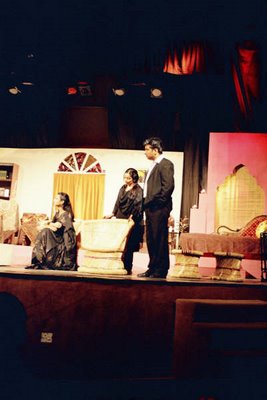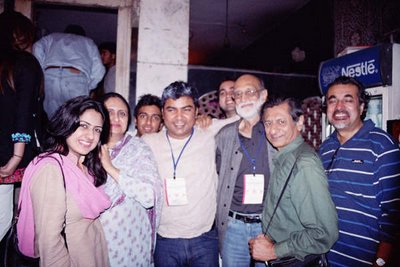
Pakistan offers an unusual experience for Indians. It has a flavour different from India; we savour it, and yet it is not different enough to alienate. A chance to visit Pakistan is always welcomed.
Though I have visited Pakistan twice before, I debuted as a professional on this trip. It began with a chance conversation with Usman Peerzada at the Bonn Biennale Theatre Festival at Bonn this summer. I had just finished my performance as part of the Agra Bazaar troupe and had reached the Opera House for my dinner. As I walked past the delegates in the foyer to the corner where the buffet was laid out, I heard Madan Gopal Singh, a Sufi singer and a fellow performer, call out my name. He said, "Come, let me introduce you to this gentleman." The gentleman was Usman Peerzada, CEO of the Rafi Peer Theatre Workshop group which organizes the World Festival for Performing Arts in Lahore every year. Usman briefed me about the festival, his passions, his family, his father, and everything that inspires him. He extended an invitation to me and we bid good bye with a promise to meet in Lahore this November.
So on November 08, 2006 at approximately seven in the evening I stepped into the probing tentacle connecting the airport terminal with the airplane. As we, a group of eleven people, walked out of the magnificent Allama Iqbal International Airport's building on to the driveway, the air was redolent with excitement. We turned around to look at the airport's façade and I must admit I have not seen a more tastefully done airport in the subcontinent. The volunteers to receive us were warm, smiling and at once made us feel at home. There is one thing in particular I've noticed about Pakistani people. They give an awesome reception when once they get to know you are an Indian. Sometimes I am so overwhelmed that I start feeling guilty that we may not reciprocate such warmth when they'll visit us.
The drive on The Mall was pleasing. I've often heard comparisons between Lahore and Delhi. Well, partially they may remind of each other but I think Lahore reminds me more of Bangalore. We call Bangalore a city of gardens and that what Lahore is. However, the canal really makes Lahore unique. Like the aorta it pumps character in to the city of Lahore.
We drove straight from the airport to the Al-Humra Cultural Complex. The open air theatre is a sight to behold. The red brick building, reminiscent of the Colloseum in Rome, was draped in banners, posters, coloured flags. The adjacent premises had camps erected as performance spaces but the most happening spot was the Food Tent. Dining out there was like what they say in New York – if you stand at Times Square for ten minutes, you'd probably run into people from all races. The festival's edition this year has 700 artists participating from 40 countries. And that was palpable when we stepped into the Food Tent.
The Peerzada's are a family of exceptionally talented people but what really makes them stand out is their unique skill to pool in their individual talents into a formidable enterprise educating, performing, supporting, promoting arts and culture in Pakistan. They're truly the cultural ambassadors of Pakistan. We were greeted by the blue-eyed handsome Imran Peerzaada. His silver locks and charming smile immediately arrested us and put us at ease too. The next couple of hours saw us running into all the Peerzada's including the sisters, and the next generation that includes the indefatigable Aleena and the handsome and charming puppeteer Shehriyar. Over the last weekend I have firmly come to the opinion that the Peerzada's have some secret recipe, a magic potion, which keeps them fresh, high-spirited and charged 24X7.
The performance that we brought to the festival is an adaptation of an Irish play by Brian Friel called "Aristocrats." Sabina Mehta Jaitly, our director, adapted the play into the Indian context – a Muslim Taluqdari family – and rechristened it as Mirza Bagh. The play unravels the highs and the lows of the landed Muslim aristocracy in post-partition India. Our performances were slated for the 10th and 11th November. And with bated breath we opened the play on the evening of November 10th. But when people came up to us and said they loved the play, we felt redeemed. Though I didn't know many in the audience but some were introduced to us. One was Salima Hashmi, Principal of Beaconhouse National University, author, painter, curator, the list is endless. She doesn't need any introduction in Pakistan. It was a privilege to meet her and I was particularly excited as I may get to play Faiz Ahmed Faiz's role, her father, in a play when I return to India later this week. There can't be a better person than her to acquaint me with the great poet.
I also met Shahnaz and Fakir Syed Aijazuddin. Shahnaz has been in correspondence with friend and fellow Dastaan-performer, Mahmood Farooqui, in India for over a year now. Shahnaz has been working at translating the epic Dastan-e-Amir Hamza into English while Mahmood and I have been performing Dastangoi in India for the past year. Thus it only made sense for us to meet and spend time together. They graciously invited me to their magnificent house for dinner and I had one of the most memorable evenings in Lahore at their place. We talked about everything that was dear to our heart and parted on the note that we have to get together again next weekend with a little Dastangoi mehfil or baithak of our own.
Besides, acting my other passion is poetry. With few friends I run an online writers' community called Caferati. However, what started two years back as a very local endeavour has mushroomed into a fledgling international community of writers and poets and we have three wonderful writers from Lahore as members of this forum. Back in India we have a Caferati practice that we meet at least once a month and share our writings. I thought it was perfect for me to utilize this trip to Lahore to meet the fellow Caferatians. So, I called up Sajjad Khan, a brilliant upcoming writer and asked him to organize the read-meet event. Come Sunday afternoon and I walked into his house with my beautiful cousin Nida, a graphic designer and a photographer, to be greeted by seven exceptionally talented young Pakistani writers. We sat over Sheesha and coffee and read and heard some heart-moving poetry.
I have been in Pakistan for just five days but I seem to be having the most memorable time I've had had for long. When we segregate people for long, the lines between fact and fiction blur. Our curiosity leads us to lap up any information thrown at us and in order to know the other, we start relying on anything offered – second-hand accounts, hearsay, stories, etc. and we create as what Amitava Kumar calls "textbook enemies." We can deconstruct this enemy only if we encourage people to people contact. That is the only way to see the human in the other.